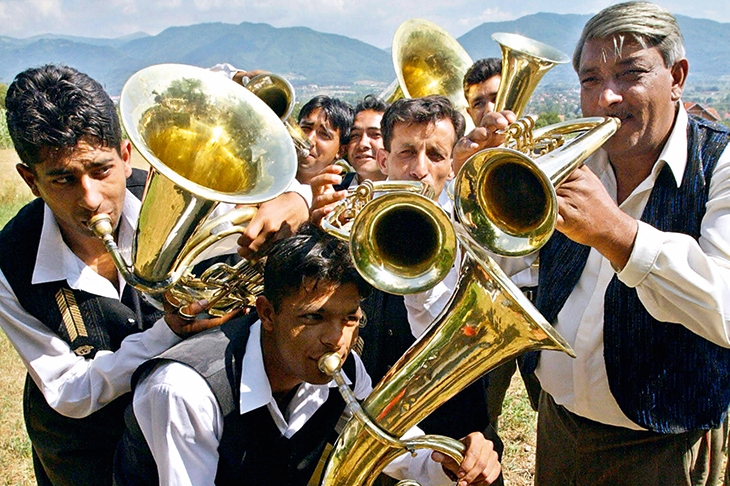When brass instruments with button-operated valves were introduced in the first half of the 19th century, music-making changed. Once requiring a semi-professional approach, it could now be quickly mastered by large groups of working people. A noisy result were Britain’s colliery bands: but a more spirited upshot was Serbia’s trumpet tradition.
Like the colliery bands, Serbian brass music had a political imperative — re-weaving national identity after 500 years of Turkish occupation. The leader who first hit on trumpets as a vehicle for this joie-de-liberté was Prince Milos Obrenovic, who created the first Serbian brass ensembles in 1831. They took swift hold, providing an outlet for everyday south Slav exuberance.
The resulting fast, rhythmical brass-playing has led to the panacea term, ‘Balkan beats’. To western hipsters, the distinctions between (Latin) Romanian culture and (Slavic) west Balkan culture are secondary. Within the region, however, the semiotics of a regional folk dance or costume crackle with contemporary relevance.
When it comes to exporting their culture, the Serbs have wisely put such granularity aside. Filmmaker Emir Kusturica — who has lately retreated to a model village near Guca — creates a fantasy version of the Balkans perfectly suited for overseas consumption. Similarly, impresarios such as Sanja Ilic of Balkanika and Goran Bregovic have produced export versions of Balkan music. Like the ciabatta — invented in the 1980s to compete with the baguette — there is nothing not to like about it, providing it doesn’t make too full a claim to authenticity.
The reality of Balkan music is too serious for export. Pop performances last four hours, and wedding bands play for ten. Competitors on reality music shows perform two songs — one folk and one mainstream — then get detailed feedback from the living legends of Serbian and Yugoslav music. Among the judges is turbo-folk originator Ceca, ‘Serbia’s Mother’, who was married to paramilitary leader Arkan at the age of 22, cradled his dying head at the age of 27, and has never remarried since.
The promise of such cultural red meat is drawing growing numbers of visitors to the Guca Trumpet Festival, in the pristine mountains of western Serbia. Founded in 1961 by a dispossessed landowner — in the face of opposition from Tito’s functionaries, who closely monitored the national cultures of the Yugoslav republics — it has since grown organically, acquiring a claim to being the largest congregation of trumpet players in the world.
The components are not complicated: large amounts of brass music, plum spirit, and barbecued meat (one of Serbia’s many hyperbolic claims is to have invented the burger). The plum spirit is home-made and — in the normal course of events — drunk before each meal, including breakfast. Guca not being the normal course of events, this rakija is drunk all day. Even so, the musical aspect maintains the thoroughness and seriousness of purpose found across the Balkans. Trials for the climactic Sunday brass-band competition start months before. Each of the final competitors plays not once, but three times. Unlike most festivals — which expand and diversify — Guca has become more purist, in recent years banning all music except trumpet bands.
Today’s festival, viewed from afar, is not unlike many others. Punters march happily along avenues formed by tented stalls and bars. The corners are formed by Tremalchian displays of grilled and roasted meat. Animals are still roasted whole, on pulley-operated pyramidical rotisseries taking five or seven pigs (pork having been the only meat exempt from the Turkish tithe). The whole site is blanketed in a smell impossibly provocative to a dog, or a vegetarian. Detachments of Serbian police — a coveted job — lounge in the bars watching football and sipping beer. Mountain Serbs stay away because of what they say is a new commercialism, but have been readily replaced by city-slickers from Belgrade. The capital’s most popular bars reappear in pop-up form.
Like Serbia itself, the trumpet festival divides opinion. ‘I never knew you could play a trumpet that way,’ was Miles Davis’s deadpan comment.
Near to Guca is Uzice, the first town in Europe to be liberated from Hitler’s Germany. In 1941, the self-proclaimed ‘Uzice Republic’ stood for three months against 50,000 members of the SS Prinz Euchem Division (a reference to the Frankish general who first invaded from the north-west, 300 years earlier). France stood for ten days, they tell you in Uzice: we stood for 90! When the next-but-one war came — in 1999 — only a single cruise missile hit in the town, destroying the post office. A nearby armaments factory remained untouched. According to local gossip, Tito once had the good sense to insure it with Lloyds of London — and the British are too pragmatic to blow up things they’ve underwritten.
Serbia’s lot has been to play off the Great Powers. If the East-West showdown comes, the Serbs will finally face an impossible choice. Go to Guca while you can.






Comments